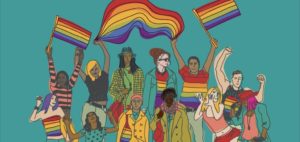LGBTQ Youth Confront Reversal of Progress
American youth and parents are having to confront questions we thought were once resolved. Can you mention sexual orientation and gender identity in the classroom, or does it pose a threat to school students? Does it further an inclusive educational experience instead? As initiatives advance seeking to muzzle schoolteachers on LGBTQ-related topics, this comes at the same time as banning many Black and Indigenous history materials and books. These actions and rhetoric spreading across the states are birthed from the same bigoted places within closed minds and hearts. The initiatives concocted by anti-LGBTQ organizations are shipped to right-wing legislators in various states. In Florida, a state legislative panel recently approved the Parental Rights Education Bill, dubbed the “Don’t Say Gay” bill. This isn’t the only problematic state legislation popping up.
Zack Ford is a LGBTQ activist and Press Secretary at Washington’s Alliance for Justice who has said at heart that he was an educator first. His journalism and communications has been tracking news like this and helping the LGBTQ+ community at large understand their implications. His work is desperately needed during these times. According to the Gay, Lesbian & Straight Education Network, the U.S. states of Louisiana, Mississippi, Oklahoma, and Texas already have laws on the books banning or restricting discussion of sexual orientation and gender identity in public schools. Florida has made a lot of headlines lately, but they are not the only state to try reversing the progress made towards equal rights for LGBTQ+ individuals. President Joe Biden weighed in on it, calling the recent Florida legislation a “hateful bill” and he let LGTBQ+ youth know they are “loved and accepted” as they are.
Alabama, Arizona, South Carolina, and Utah repealed such statutes in recent years, but some school districts have seen parent-led campaigns to rid school libraries of LGBTQ-themed books even if the rest of their state doesn’t support these actions. It goes to show anti-LGBTQ sentiment is quite active. There are real-world consequences for our young people because policies like this cause social isolation. With the isolation comes an increase in depression, anxiety, self-injury, suicidality, homelessness, and substance use. Brandon Wolf, spokesperson for Equality Florida, commented on reducing these mental health and social crises by creating environments that promote comfort when disclosing sexuality and gender identity. Parents collaborating with teachers and the community are a powerful resource and network in times like this.
Other bills have been introduced which threaten to set the progress for the community back. A federal judge in Arkansas blocked a controversial bill in July, but in Ohio a similar version of it still made its way to hearing. It’s named the Save Adolescents from Experimentation (SAFE) Act. This bill prohibits specific medical coverage for LGBTQ+ youth, specifically trans or nonbinary people. One woman I spoke with said she found this recent trend dangerous and terribly troubling. She herself suffered from suicidal ideation and self-harm in her past. Now as a woman in her mid-fifties she said, “I think a lot of the hardships that I walked through could’ve been avoided if I had experienced the kind of communication and affirming care when coming out that teens were starting to gain access to. To have it and then try to take it away from them is a travesty.”
Two teens I reached out to wondered what the implications for their teachers and families of students would be. What if a teacher has a same-sex spouse? Would it mean they couldn’t have a photo of their family on their desk? Would it mean teachers—who had been willing to share their joy and success in life, now hold back sharing positive experiences for fear of the school telling them it’s an inappropriate topic for discussion? It’s important to have not only allies, but adults who are a part of the LGBTQ+ community setting an example and providing inspiration for meeting your life goals. “Seeing someone who is like us and has self-love and self-respect, it helps with the challenges we as teens face.
We all know that homophobia and facing microaggressions can break us down and harm our self-esteem. We need teachers and other staff to feel comfortable being themselves. What happens if they feel they have to hide parts of themselves?” Brandon Wolf of Equality Florida echoed some of these concerns asking, “What if a school asks students to present about their families during a career day, but that child has same-sex parents?”
Again, there is the risk of school aged youth feeling isolated and the progress made thus far being reversed. I grew up in a religiously and socially conservative environment myself. I never dared to come out and openly live as a queer young woman. Like some I polled who are my age, we weren’t ashamed of who we were, but we were afraid of the backlash from our schools, our families, and the churches we attended. That vulnerability didn’t disappear nowadays, but it was becoming a safer environment for being out. I recall feeling like I had to develop a socially acceptable exterior, but today’s youth were becoming free from that burden. Many schools and communities were becoming accepting environments with teens building upon open communication with adults who were happy to listen to them. I’m worried the policies being proposed and implemented will reverse those gains.
Why would any of us want adolescents—who are already vulnerable to mental health struggles, to confront these backward trends? If we care about civil rights, then we need to call up our legislators and make our voices heard regarding these bills. Going forward we must vote for lawmakers who have the mental well-being of our youth prioritized. We need to vote out right-wing legislators who have shown themselves to be the instigators of reversing progress.


